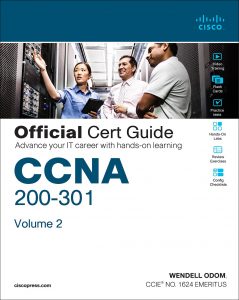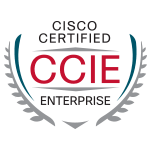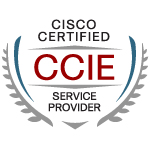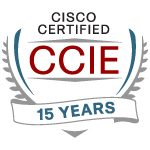CCNA Course
New CCNA Certification
A CCNA 200-301 certified professional can install, operate and configure LANs and WANs for small to medium-sized networks. The CCNA course covers the course Implementing and Administering Cisco Solutions (CCNA).
In the CCNA certification, we cover the new exam 200-301 content. Our CCNA training course covers the cost of the official certification exam. The certification exam indicates the foundation knowledge of networking equivalent to an apprenticeship in networking.
The CCNA certification covers many topics, including IP connectivity, IP services, network access, network fundamentals, security fundamentals, automation, and programmability. The new CCNA cert lays the foundation you need to specialise in security, collaboration, data center or service provider.
After attaining the CCNA certification, individuals can choose to move up to the professional level certifications, e.g. (CCNP Enterprise, CCNP Security, and CCNP Collaboration) that lead to the expert level. Professional-level certifications assure the employer that an individual can design, install, configure and troubleshoot a medium to large LAN, WAN environment.
At Logitrain, we do our best to provide the highest quality training possible. Our trainers ensure you are professionally trained for the CCNA certification while attending the Cisco course Sydney and Melbourne. What makes us unique is our ability to provide practical training with deep insight into the real world, helping you become capable of handling the challenges in the practical world.
The CCNA 200-301 certification training course replaces all concentrations.
This certification is considered a key requirement for the following jobs:
- Helpdesk Operator
- Network Engineer
- Network Administrator
- Technical Support Engineer
- First-Level Network Support
- Field Engineer
- Other LAN/WAN related jobs
There are no formal pre-requisites for CCNA certification, Logitrain recommends basic networking knowledge, basic IP addressing and understanding of network fundamentals.
Candidates can achieve this certification by passing the following exam.
- 200-301 CCNA Implementing and Administering Cisco Solutions (CCNA CERTIFICATION)
The certification exam can be registered and attempted within 3 months of course/module completion at Logitrain training centre on weekdays during normal business hours (excludes public holidays)
Ciscopress CCNA 200-301 course material included
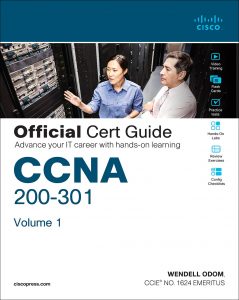
- Network Fundamentals
- Network Access
- IP Connectivity
- IP Services
- Security Fundamentals
- Automation and Programmability
This course is likely to add to the employment related skills of the participants. The skills developed are likely to be used in the course of being an employee or working in a business.
- Students
- Recent Graduates
- Individuals seeking to start a career in networking
- Helpdesk operators
- Candidates entering the IT job market
- First-level network support staff
- System engineers and account managers
- Individuals seeking CCNA, CCNP and CCIE certifications
- Explain the role and function of network components
- Describe characteristics of network topology architectures
- Compare physical interface and cabling types
- Identify interface and cable issues (collisions, errors, mismatch duplex, and/or speed)
- Compare TCP to UDP
- Configure and verify IPv4 addressing and subnetting
- Describe the need for private IPv4 addressing
- Configure and verify IPv6 addressing and prefix
- Compare IPv6 address types
- Verify IP parameters for Client OS (Windows, Mac OS, Linux)
- Describe wireless principles
- Explain virtualization fundamentals (virtual machines)
- Describe switching concepts
- Configure and verify VLANs (normal range) spanning multiple switches
- Configure and verify interswitch connectivity
- Configure and verify Layer 2 discovery protocols (Cisco Discovery Protocol and LLDP)
- Configure and verify (Layer 2/Layer 3) EtherChannel (LACP)
- Describe the need for and basic operations of Rapid PVST+ Spanning Tree Protocol and identify basic operations
- Compare Cisco Wireless Architectures and AP modes
- Describe physical infrastructure connections of WLAN components (AP,WLC, access/trunk ports, and LAG)
- Describe AP and WLC management access connections (Telnet, SSH, HTTP,HTTPS, console, and TACACS+/RADIUS)
- Configure the components of a wireless LAN access for client connectivity using GUI only such as WLAN creation, security settings, QoS profiles, and advanced WLAN settings
- Interpret the components of routing table
- Determine how a router makes a forwarding decision by default
- Configure and verify IPv4 and IPv6 static routing
- Configure and verify single area OSPFv2
- Describe the purpose of first hop redundancy protocol
- Configure and verify inside source NAT using static and pools
- Configure and verify NTP operating in a client and server mode
- Explain the role of DHCP and DNS within the network
- Explain the function of SNMP in network operations
- Describe the use of syslog features including facilities and levels
- Configure and verify DHCP client and relay
- Explain the forwarding per-hop behavior (PHB) for QoS such as classification, marking, queuing, congestion, policing, shaping
- Configure network devices for remote access using SSH
- Describe the capabilities and function of TFTP/FTP in the network
- Define key security concepts (threats, vulnerabilities, exploits, and mitigation techniques)
- Describe security program elements (user awareness, training, and physical access control)
- Configure device access control using local passwords
- Describe security password policies elements, such as management, complexity, and password alternatives (multifactor authentication, certificates, and biometrics)
- Describe remote access and site-to-site VPNs
- Configure and verify access control lists
- Configure Layer 2 security features (DHCP snooping, dynamic ARP inspection, and port security)
- Differentiate authentication, authorization, and accounting concepts
- Describe wireless security protocols (WPA, WPA2, and WPA3)
- Configure WLAN using WPA2 PSK using the GUI
- Explain how automation impacts network management
- Compare traditional networks with controller-based networking
- Describe controller-based and software defined architectures (overlay, underlay, and fabric)
- Compare traditional campus device management with Cisco DNA Centre enabled device management
- Describe characteristics of REST-based APIs (CRUD, HTTP verbs, and data encoding)
- Recognize the capabilities of configuration management mechanisms Puppet, Chef, and Ansible
- Interpret JSON encoded data
We highly recommend spending ample time for self-study during this course by reviewing and consolidating what you’ve learned, to be well prepared for the exam.

Take the certification exam within 3 months of course / module completion

Take the official certification exam at Logitrain, a local VUE test centre or online

Course material in digital format is included for flexibility and ease of use

Mock test is included in the full-time courses to assist with your preparation

There is no substitute for experience. We have trained over 1500 CCNA students

Relax, we will beat competitor’s advertised price. Our course has no extra costs
“We have helped thousands achieve Cisco Certifications, let us help you”
– Murad Tanvir, Double CCIE #17081
Founder and CEO Logitrain
| Location | Type | Duration | Price | Dates | |
|---|---|---|---|---|---|
| Location | Type | Duration | Price | Dates |
The supply of this course/package/program is governed by our terms and conditions. Please read them carefully before enrolling, as enrolment is conditional on acceptance of these terms and conditions. Proposed course dates are given, course runs subject to availability and minimum registrations.

Find out why we are the leading choice to help boost your career in Australia

“The trainer explained everything very well. Logitrain was very helpful for me in getting a better overall understanding of CCNA. I previously had studied it 2 years earlier but required revision.”
– Felice Amenta, Senior Service Management Officer at Optus, Rating: 4.8/5
“I recently followed the ITIL Foundation course at Logitrain. The training, materials and facilities were excellent and I would not hesitate to train with Logitrain again.”
– Rob Stockey, Senior Engineer at APAC, Rating: 4.8/5
“Had a blast! Great course, will be back soon to do another.”
– Justin Blackford, Systems Administrator at Gloria Jean’s Coffee, Rating: 4.8/5
“The trainer was very patient and gave everybody the opportunity to participate.”
– Tim Symonds, Solutions Architect at MSC Mobility Solutions, Rating: 4.8/5
Over 1000 organisations have relied on Logitrain to be their trusted training partner.
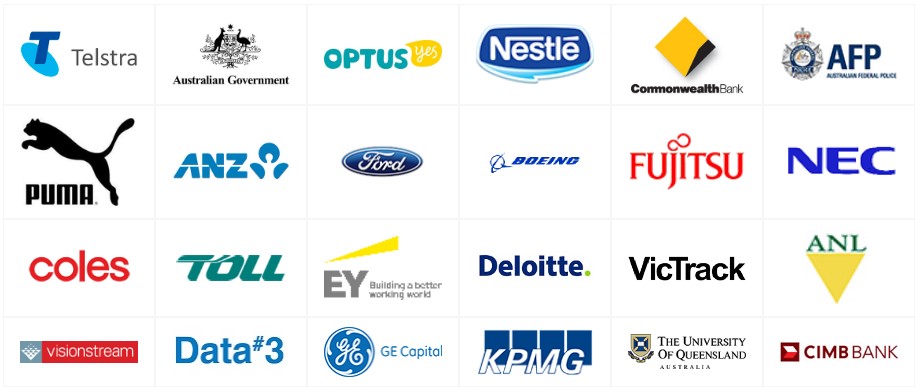

Don’t Wait. Please fill the form now.
